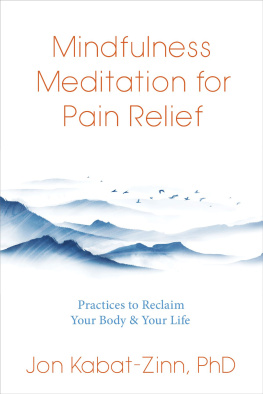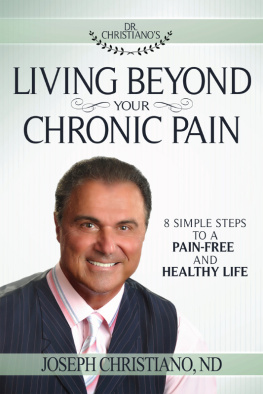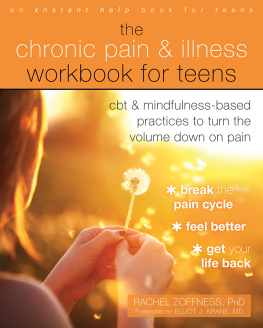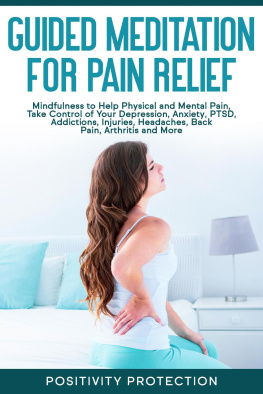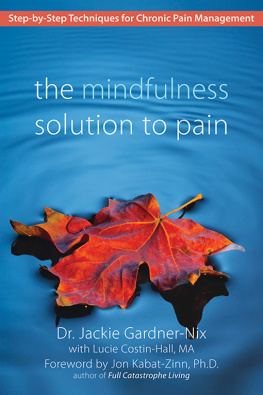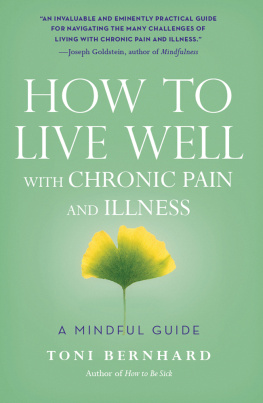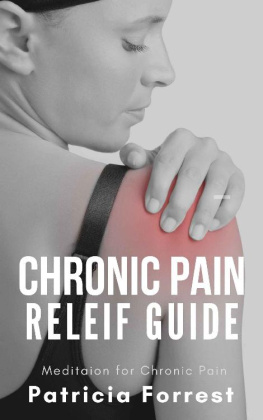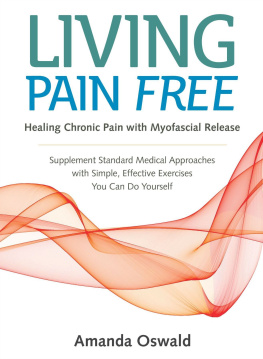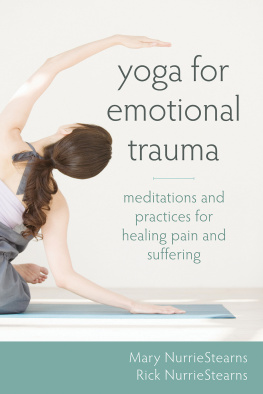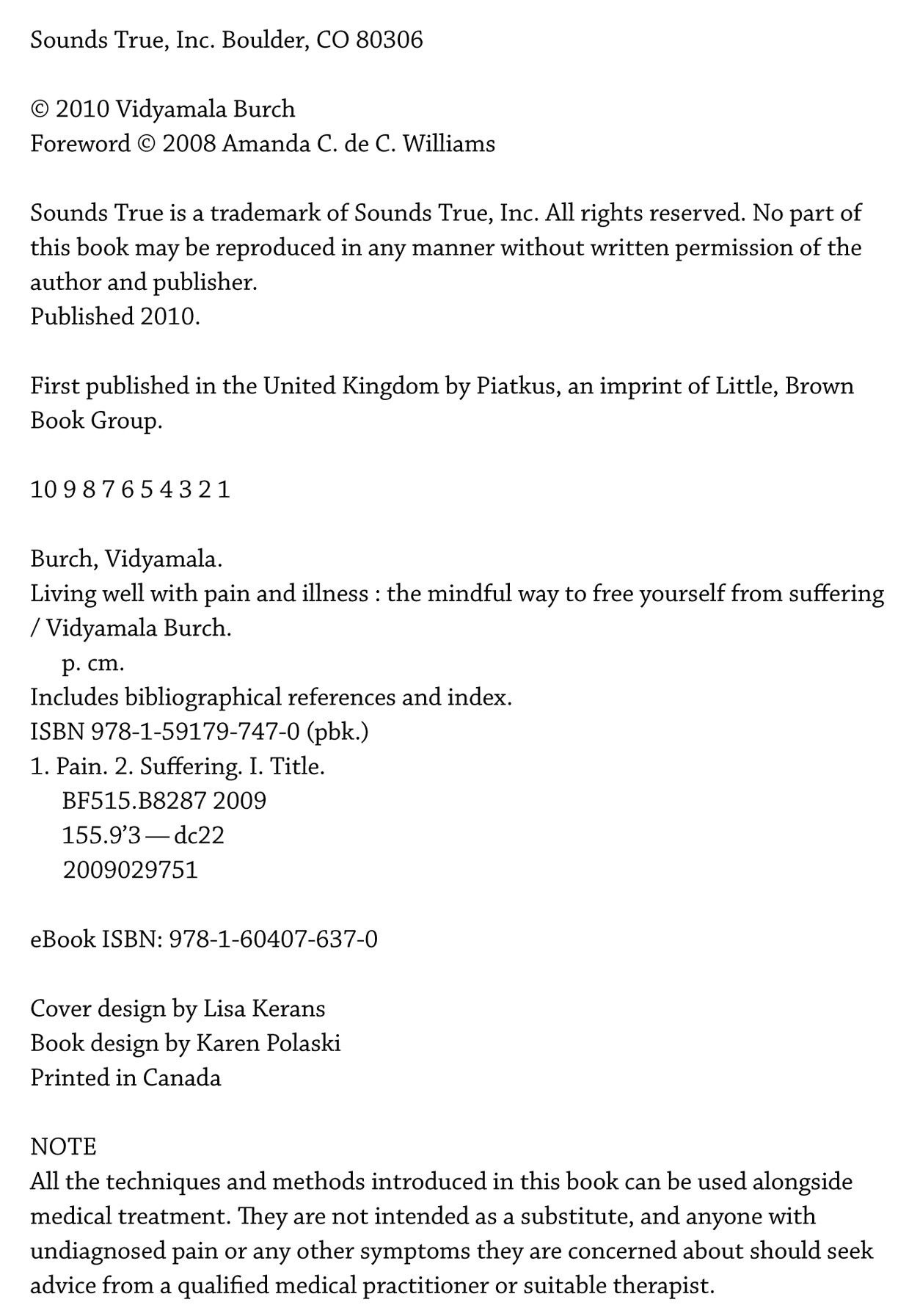
Copyright
Praise for Living Well with Pain and Illness
The cultivation of mindfulness can make a profound difference in how we relate to pain and whether chronic pain conditions need to turn into endless suffering and misery. This has been known over the past 2,600 years and is now being supported by studies in both medicine and neuroscience. In this book, Vidyamala makes the practice of befriending your experience through mindfulness, however unpleasant or pleasant it may be, both commonsensical and compelling. I admire her tremendously. This is a beautiful and very important book. It could save your lifeand give it back to you.
JON KABAT-ZINN, PHD, AUTHOR OF FULL CATASTROPHE LIVING AND COMING TO OUR SENSES
This is a wonderful work, one of those books where you know within a few pages that it is going to be worth stopping everything else in order to make time to read it. The book is a moving and compelling invitation to bring a radically new way of working with the fact of our pain. It is a book of enormous tenderness and honesty. Here is wise guidance on how we can move beyond our natural resistance to our pain to a willingness to be with it, and how we can live with greater ease by turning toward what we most fear about our pain and suffering.
MARK WILLIAMS, COAUTHOR OF MINDFULNESS-BASED COGNITIVE THERAPY FOR DEPRESSION AND THE MINDFUL WAY THROUGH DEPRESSION AND PROFESSOR OF CLINICAL PSYCHOLOGY AND WELLCOME PRINCIPAL RESEARCH FELLOW, DEPARTMENT OF PSYCHIATRY, UNIVERSITY OF OXFORD, UK
Vidyamala Burch has practiced mindfulness for many years, and she has applied the practice to the relief of physical suffering. She has now embodied the fruits of her extensive experience in a very readable and useful book. I hope that Living Well with Pain and Illness will have a wide circulation in a world where, despite all our progress, there is still so much suffering, some of it unnecessary.
URGYEN SANGHARAKSHITA
It is one thing to have our pain and emotions and another to be ruled by them, one thing to live our life and another to live in our thoughts about our life, one thing to make choices according to what we hold as important and another to helplessly act as our habits will have us do. This wonderful book helps us to appreciate these differences. The act of reading it alone may bring a small measure of space, life, freedom, warmth, and gentleness to your life. Following the direction it suggests could bring you much more and radically change your life for the better.
LANCE M. MCCRACKEN, PHD, CLINICAL PSYCHOLOGIST AND CLINICAL LEAD, BATH CENTER FOR PAIN SERVICES, ROYAL NATIONAL HOSPITAL FOR RHEUMATIC DISEASES AND CENTER OF PAIN RESEARCH, SCHOOL FOR HEALTH, UNIVERSITY OF BATH
This is an excellent self-help book for sufferers of chronic illnesses. It guides the reader in how to deal with pain, illness, frustrations, anxieties, and even life itself. Vidyamala has written a beautiful, profound, yet easy to understand book on how to live happily, regardless of what state of pain or difficulty you are in. A definite must-read for my patients, students, and colleagues in health care. A milestone book on living mindfulness fully.
TONY FERNANDO, MD, PSYCHIATRIST, UNIVERSITY OF AUCKLAND, FACULTY OF MEDICAL AND HEALTH SCIENCES, NEW ZEALAND
In describing her own journey with pain, Vidyamala has written a definitive guide to the practice of meditation with pain and illness. She explains how we have a choice as to whether or not we suffer with pain, and she teaches us a quiet and reflective attitude of acceptance and kindness toward ourselves and others. Vidyamala describes how, through becoming more aware of our body and its sensations, the pain diminishes. I am happy to recommend this useful book to the members of my support group.
JAN SADLER, AUTHOR OF PAIN RELIEF WITHOUT DRUGS AND THE PAINSUPPORT WEBSITE, PAINSUPPORT.CO.UK
This book, while acknowledging the complexity of living with pain and illness, suggests creative ways to live with these challenges. Vidyamala draws not only from her own experience with chronic pain but also from the experiences of her many students who have learned, through Breathworks, to live with their pain more skillfully using mindfulness. She demonstrates skills and understanding that can help us all move through life with greater ease whatever our particular version of the human predicament may be.
PAMELA ERDMANN, MD, SENIOR TEACHER, CENTER FOR MINDFULNESS, UNIVERSITY OF MASSACHUSETTS MEDICAL SCHOOL, AND HONORARY LECTURER, UNIVERSITY OF WALES, BANGOR, UK
Vidyamala has made an insightful contribution to the current dialogue between mindfulness and the fields of medicine and psychology. Rooted in her own experience, this book will be a great support both to those living with pain and those endeavoring to find new ways of working with pain and illness.
CHRISTINA FELDMAN, AUTHOR OF COMPASSION AND COFOUNDER OF GAIA HOUSE
Grateful acknowledgment is made to reproduce the following:
from Rumi: Selected Poems, translated by Coleman Barks, 1995. Permission granted by Coleman Barks.
Ah, Not to Be Cut Off from Ahead of All the Parting by Rainer Maria Rilke, translated by Stephen Mitchell, 1995 by Stephen Mitchell. Permission granted by Modern Library, a division of Random House.
from Full Catastrophe Living by Jon Kabat-Zinn, 2004. Permission granted by Little, Brown, London.
from Waking by Matthew Sanford, 2006 by Matthew Sanford. Permission granted by Rodale, Inc.
Wild Geese from Dream Work by Mary Oliver, 1986 by Mary Oliver. Permission granted by Grove/Atlantic, Inc.
from Heartwood: Meditations on Southern Oaks by Rumi and William Guion, translated by Coleman Barks, 1998. Permission granted by Coleman Barks.
from Trust in Mind: The Rebellion of Chinese Zen Mu Soeng, 2004. Permission granted by Wisdom Publications, Somerville, Massachusetts. wisdompubs.org
from Rumi: Selected Poems, translated by Coleman Barks, 1995. Permission granted by Coleman Barks.
from Great Fool, by Ryokan, University of Hawaii Press, 1996.
from Where Many Rivers Meet by David Whyte, 1990. Permission granted by Many Rivers Press, Langley, Washington. davidwhyte.com
epigraph, from Rumi: Hidden Music, translated by Maryam Mafi and Azima Melita Kolin, 2001 by Azima Melita and Maryam Mafi. Permission granted by HarperCollins Publishers Ltd.
from Rilkes Book of Hours: Love Poems to God by Rainer Maria Rilke, translated by Anita Barrows and Joanna Macy, 1996 by Anita Barrows and Joanna Macy. Permission granted by Riverhead Books, an imprint of Penguin Group (USA) Inc.
Autobiography in Five Short Chapters from Theres a Hole in My Sidewalk, by Portia Nelson, by Portia Nelson. Beyond Words Publishing, Hillsboro, Oregon.
Pleasant and Unpleasant Events Diary adapted from Awareness of Pleasant or Unpleasant Events Calendar from Full Catastrophe Living by Jon Kabat-Zinn, Little Brown, London, 2004.
Every effort has been made to identify and acknowledge the copyright holders. Any errors or omissions will be rectified in future editions provided that written notification is made to the publishers.
For all people with difficulties everywhere. May this book give you some peace and ease. For Sona, Ratnaguna, and the Breathworks community, with deep gratitude for sharing my vision and making it real.
Do not look back, my friend


